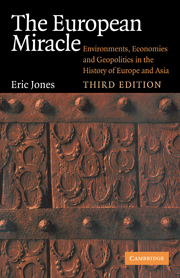Book contents
- Frontmatter
- Contents
- Preface to the third edition
- Preface and acknowledgements
- Introduction to the second edition
- Map
- EURASIA
- EUROPE
- THE WORLD
- ASIA
- EURASIA
- Afterword to the third edition
- Annotated bibliographical guide to Eurasian economic history in the very long term
- Bibliography
- Supplementary bibliographical guide
- Index
Afterword to the third edition
Published online by Cambridge University Press: 05 June 2012
- Frontmatter
- Contents
- Preface to the third edition
- Preface and acknowledgements
- Introduction to the second edition
- Map
- EURASIA
- EUROPE
- THE WORLD
- ASIA
- EURASIA
- Afterword to the third edition
- Annotated bibliographical guide to Eurasian economic history in the very long term
- Bibliography
- Supplementary bibliographical guide
- Index
Summary
Dealers sometimes place an antique or painting between a couple of excellent specimens whose provenance is known and leave it there for a week or two. The idea is that if the piece is inferior or forged it will reveal its true colours in that company What I propose in this Afterword to the third edition of The European Miracle is to subject the most challenging lines of criticism to a similar test, to see if other approaches might lead me to alter my analysis – or abandon the project – were I to start writing it now. By considering eight types of challenge that have been presented seriously and deserve to be taken in that spirit, I shall put the critics side by side with the Miracle to see how they measure up.
The thesis of the book is both simple and involved. Europe, or rather Western or north-western Europe, was a minor region that generated economic growth when other, larger societies did not. Rare moves in that direction by the great empires of the ancient and oriental world all lapsed. Moreover, fruitful economic change in Europe pre-dated the industrial revolution, which, rather than being the start of growth, emerged from a long past. The continent's advantages and achievements were varied and cumulative. The environment, for example, conferred advantages; it was probably more conducive to regional specialisation than many regions of the earth.
- Type
- Chapter
- Information
- The European MiracleEnvironments, Economies and Geopolitics in the History of Europe and Asia, pp. 239 - 260Publisher: Cambridge University PressPrint publication year: 2003



